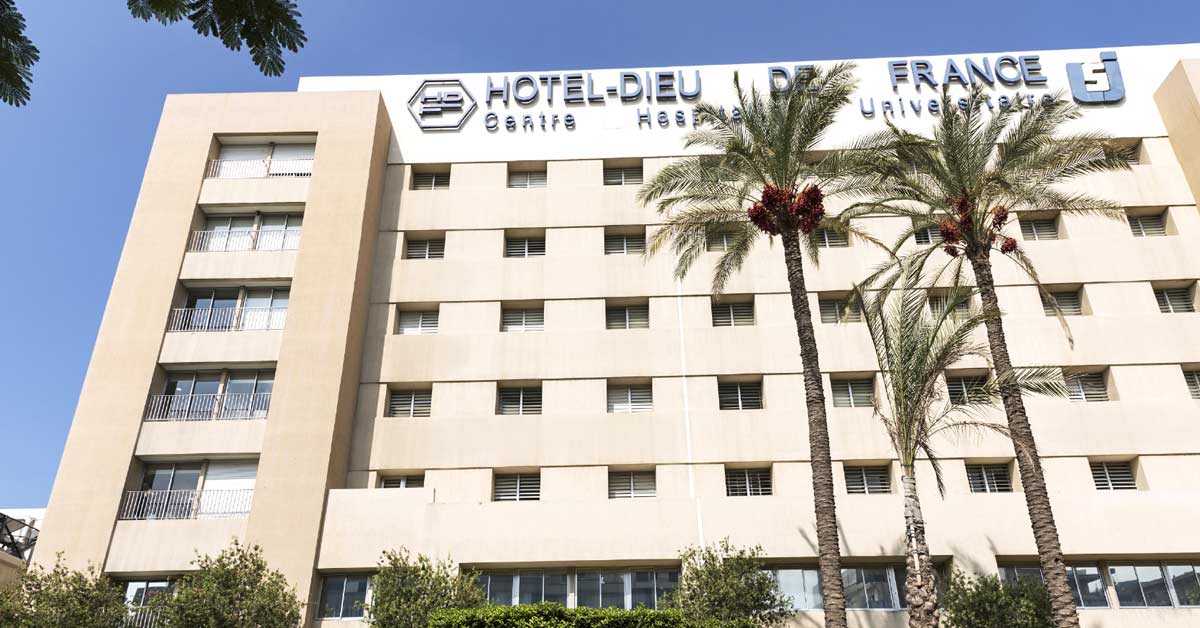HDF Crisis Management in the Face of COVID-19
One in ten patients in the world is a doctor or a healthcare worker. To ensure their protection and to welcome its patients, Hôtel-Dieu de France has implemented a crisis management plan in response to the situation on the ground in the face of the coronavirus pandemic.

Since March 1 and upon the request of the Lebanese authorities, HDF chose to rise to the challenge and take in patients with suspected COVID-19 in support of Rafik Hariri University Hospital, and thus became the first university hospital to join the battle.
During this period, HDF became safer, more attentive and firmer with protective barriers that can only be crossed by wearing a mask and gloves. The hospital also addressed the current situation with absolute transparency and professionalism.
What Was Hôtel-Dieu de France’s Role in This Time of Crisis?
The hospital confronted the epidemic very early on in late February. On March 1, the Lebanese authorities requested the mobilization of university hospitals in order to respond to the pandemic. Immediately, HDF, Saint Joseph University’s Medical Center and a non-profit institution, aware of its responsibilities and its social role, was the only one to respond.
A crisis unit was formed and held daily meetings at first, which then proceeded to become biweekly, with doctors, nurses, pharmacists and other professionals of the hospital.
A strong alliance was quickly formed with the Rodolphe Mérieux laboratory of the Faculty of Pharmacy at USJ, to detect through PCR tests COVID-19 cases.
HDF was split into two: a path for patients with suspected or confirmed COVID-19, and a separate one for patients with other pathologies. Such is the case with patients presenting flu-like symptoms and coming for a consultation: they are directed towards the Flu Center that receives 30 to 50 patients a day on weekdays. Also, a protected path has been set up in the Emergency Department with a negative pressure room.
External consultation clinics remained open and are still disinfected regularly. Social distancing measures are also applied.
Such is the case with hospitalizations that were grouped on one floor within a Respiratory Isolation Unit; and such is the case with resuscitation patients all hospitalized in negative pressure rooms. Such is the case with the Medical Imaging Department which has separated its paths and will have in the coming days a scanner dedicated to chest scans. Such is the case with the Operating Room which has an operating room with negative pressure. Such is also the case for the reception of pregnant women, whereby a maternity area has been set up.
The HDF Pharmacy Department is now producing hand sanitizers for its patients, visitors and staff.
These measures are evolving and are being reassessed by the crisis unit depending on how the situation evolves.
What Has the COVID-19 Crisis Taught Us?
It has shown us the weaknesses of a purchasing system based solely on importation. This is true for Lebanon and other countries affected by the pandemic to varying degrees.
The purchasing system has always been the most complicated issue. Already affected by the economic crisis that the country is going through, the prices of protection gears such as masks, over-gowns and overshoes have spiraled.
The demand for payment in USD is constant, despite the regulatory measures enacted by the Government and the central bank of Lebanon (Banque du Liban) which allow paying 85% of the amount in LBP and 15% in USD.
These difficulties also threaten to affect the pharmaceutical sector and the recourse to essential laboratory tests for systematic screening which will become necessary.
The crisis has also shown us, both here and elsewhere, the irrational behavior of certain people who ignore medical care that does not seem urgent to them. This will certainly have repercussions on certain pathologies tardily treated. It has shown us the unequal social support for the population, which feels insecure as much from the health crisis as from the financial and economic crisis.
How Did the Hospital Deal With These Challenges?
First, the hospital has adopted a scientific and medical response. HDF, as Saint Joseph University’s medical center, has maintained a strong scientific approach by adapting its healthcare services to the highest European and North American standards. It is taking part in current international clinical trials and is developing more than a dozen studies around COVID-19. Its resuscitation techniques with respirators and an artificial lung (ECMO) are among the most sophisticated.
Second, a humanitarian response through an information hotline, where interns and residents volunteer to respond to the questions and concerns of sick or worried people confined to their homes.
HDF also took the initiative to seek social funding for patients through a fundraising campaign aimed at Lebanon and its diaspora. The idea is to set up a social fund for COVID-19 patients with little to no medical insurance. It is to be feared that the lack of medical insurance will be substantial by the end of the health crisis as a result of the economic situation in Lebanon.
HDF plans to resume its normal activity by maintaining general and secure care services. Only through this comeback, awaited by the entire hospital-university community, will the situation return to a sustainable and economically viable functioning.
In these times of confinement, the HDF community remains, now more than ever, attentive to others, aware of its social role and close to the people around it who trust in the quality of care it provides. Doctors, nurses and all caregivers involved in this crisis deserve our utmost gratitude for their dedication to patients and the sacrifices they made during the health crisis.














